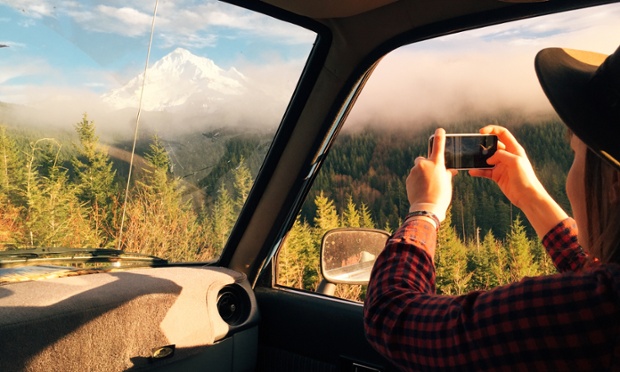Low-cost, low-carbon transport
Budget flights continue to dominate the way we travel but there has been a growing interest in alternative overland transport. Carsharing on long-distance journeys (rather than just hitching a ride to Glastonbury) has seen a spike in popularity thanks to sites such as BlaBlaCar. The French website, which caps expenses to ensure drivers can’t profit from the exchange, is particularly popular with young people on the continent but has been picking up users in the UK. We tested the site last year, and managed to get from London to Paris for £25 (hanging out with some musical skateboarders along the way). Liftshare, however, remains the UK’s largest car share scheme, with around 300,000 members. We’ve also rounded up the best ride-sharing websites and apps to help you hitch rides wherever you are in the world. In North America, it’s still possible to go on an epic road trip for free, by delivering a car across the country, or helping transport rental vehicles to new destinations. Check out our guide to “driveaways” for more details. Of course, rail travel has always been a low-carbon, not to mention romantic, way to get around. Interrail continues to be a rite of passage for young travellers thanks to its much-loved youth passes, which give travellers aged 25 or under a month’s worth of unlimited train travel around Europe for just £359. Check outSeat61 for incredibly comprehensive, practical advice on planning international train travel. And while it’s not the cheapest, travelling by cargo ship should provide an adventure in its own right. Useful sites include cargoshipvoyages.com andfreightercruises.com. Due to the sheer size of the ships, the amount of energy taken up by transporting even 100 passengers is essentially negligible.
Budget beds
Crowdsourced accommodation has exploded in the past decade, transforming the way we travel and shifting the focus from hotels and B&Bs to local homes. AirBnbis the glossiest site, with more than a million private homes listed around the world. Still, budget travellers may find the original room-sharing site,Couchsurfing, which gives travellers the opportunity to be hosted for free, an even better option. Housesitting is also a great option for those eager to stay in a destination for a longer period – here’s our guide to getting started. And those planning a cycle tour should check out Warm Showers, a free hospitality exchange community for cyclists around the world.
Eco hostels
The budget travel scene is a rather conscientious one (champagne spas just don’t do it for backpackers), so it’s no surprise that a large number of hostels around the world have been founded on the principles of low carbon living. In Australia, theGrampians Eco YHA hostel is a leading example; the building runs off solar heating, rainwater tanks and recycles “greywater” from the sinks and showers, resulting in 50% less waste and energy consumption than your average hostel. The JetPak Ecolodge in Berlin gets its power from 100% renewable sources, has a wood powered C02 neutral heating system and on-site composting. TheMeininger Hotel (which also offers hostel style rooms) in Brussels is also run on a carbon-neutral basis, as is the chain of MacBackPackers hostels in Scotland, which includes the High Street Hostel in Edinburgh. It’s no surprise that Portland, Oregon, has one: the Portland Hawthorne Hostel has four eco-roofs, on-site composting and uses 100% renewable energy. They also grow their own vegetables.
Budget eco adventures
Adventure travel has always been associated with expensive, long-haul flights, pricey equipment and lots of planning. But explorer Alastair Humphreys has been trying to change that perception, championing “microadventures” as an accessible alternative. Defined as “simple expeditions and challenges which are close to home, affordable and easy to organise,” they can involve anything from wild camping on your nearest field to spending a day making a raft to traverse a local stream. Humphreys has put together a round up of British microadventuresto get you started. Tribewanted is a sustainable tourism project that invites travellers to join self-built communities around the world. Their latest project is based on Gonubalabala Island in Papua New Guinea where you can help build beach huts and learn about off-grid living. It’s kind of like The Beach, with a better track record. Another option for someone seeking a budget adventure is Wwoofing. The long-running organisation connects volunteers with organic farms and sustainable living projects around the world; volunteers get food and accommodation in exchange for their labour. Take a look at our guide to working farm holidays for tips and advice.
Overland travellers
Long distance travel without flying will always be a challenge, but for many of those who embark on an overland adventure, that’s the biggest reason to do it. We’ve rounded up some interesting travellers around the world who might inspire you to start an overland trip of your own. Tristan Bogaard (above) is cycling 12,000 miles through Europe, using warmshowers.org to find places to stay and using Instameets to meet guides. Nathan Ashker (above) travelled from Asia to US without flying, a journey that will be the subject of a photography book #AsiaToAmerica: Without A Plane. “Home is where you park it.” That’s the mantra of Foster Huntington (above), who “stopped working for the man and started living in a van”. His project, Van Life, documents the lives of people on the road. Forrest Mankins (above) is in the midst of an epic overland trip, camping out in his LandCruiser along the way.

















